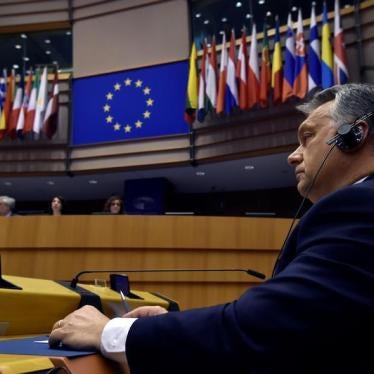Manfred Weber, the chair of the European People’s Party (EPP), took part in a live Facebook Q&A session earlier this week.
I took the chance to ask Weber what the EPP, the biggest group in the parliament, plans to do about their member Fidesz, the ruling party in Hungary.
Under Prime Minister Viktor Orban, the Fidesz government has repeatedly undermined the rule of law, as well as checks and balances of the executive through the courts, media, and civil society. This year those attacks have intensified, with a law aimed at shutting down a reputable academic institution, the Central European University, another to curb the work of foreign-funded nongovernmental groups inspired by Russia’s foreign agents law, and a third that doubles down on the country’s abusive border regime for asylum seekers.
Yet Fidesz’ membership of the EPP has helped shield Hungary from meaningful European Union action by blocking resolutions in the parliament aiming to address serious rule of law and human rights concerns, despite the fact that the government’s actions breach not only European values, but those of the EPP itself. Those values include respect for rule of law and human rights and encouraging a vibrant civil society.
Weber’s response to me was troubling. While acknowledging my concerns, he argued that Hungary’s government has taken into account recommendations by the European Commission on certain laws that have been identified as problematic, including changes to the constitution.
This is at best a half truth and at worst deliberate obfuscation. In reality, Fidesz has created the illusion that they are addressing concerns while in fact only making cosmetic changes that don’t tackle the fundamental issues. For example, when the EU pressed Hungary over its decision to lower the retirement age for judges, and sack all those older than the new limit, the government reversed the decision - but only after it had appointed new, more loyal, judges to key positions.
While Weber was reluctant to criticise Fidesz, he was happy to point the finger at Poland’s ruling party, decrying the supposed lack of communication between the EU and the Polish government. But that’s hardly surprising, given Poland’s ruling PiS party is not an EPP member.
Weber’s deflection also ignores the fact that the troubling negative human rights developments in Poland are in part a consequence of the EU’s failure to take robust action on Hungary.
By letting Fidesz take the country down an authoritarian path without any tangible consequences, the EU has signalled that other EU states can do the same.
If Weber really wants to bring about positive changes both in Hungary and Poland he should urge EPP to reassess Fidesz’s membership in EPP, and consider expelling the party.
|
Dispatches
Hungary is Taking European Values for a Ride
European People’s Party Should Reassess Fidesz Membership
Your tax deductible gift can help stop human rights violations and save lives around the world.
Region / Country
Most Viewed
-
January 16, 2026
Iran: Growing Evidence of Countrywide Massacres

-
January 23, 2018
Hidden Chains

-
September 30, 2024
“They Destroyed What Was Inside Us”

-
November 25, 2019
A Dirty Investment

-
October 29, 2019
“Maximum Pressure”






